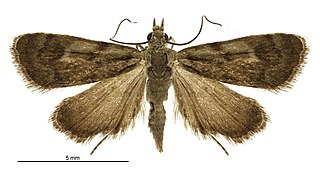
Lichenaula calligrapha is a species of moth of the family Xyloryctidae. It is known from rainforests from northern Queensland to Victoria, although it has also been recorded from the Australian Capital Territory, New South Wales and Tasmania.

Izatha apodoxa is a moth of the family Oecophoridae. It is endemic to New Zealand, where it is known from scattered localities in the southern North Island. This species is variable in appearance and comes in two forms, a grey form and a black and white form. In the grey form it is very similar in appearance to I. notodoxa and in the black and white form to I. katadiktya. At present the larvae and biology of this species is unknown.
Helcystogramma gradatum is a moth in the family Gelechiidae. It was described by Edward Meyrick in 1910. It is known from north-eastern India.

Glaucocharis stella is a species of moth in the family Crambidae. It is endemic to New Zealand.

Pyrgotis plinthoglypta is a species of moth of the family Tortricidae. It is endemic to New Zealand and is found throughout the whole country. The preferred habitat of this species is native forest. The larvae of this species feeds on rimu leaves from under a silken web. It pupates in loose cocoons amongst rimu foliage. Adults are on the wing from October to May and are night flying. They are attracted to light and can be collected by beating their host tree. The adult insect resembles a small dried fragment of rimu foliage when at rest.
Hypatima ericta is a moth in the family Gelechiidae. It was described by Edward Meyrick in 1913. It is found in Sri Lanka.

Kiwaia brontophora is a species of moth in the family Gelechiidae. It was described by Edward Meyrick in 1885. It is found in New Zealand.

Kiwaia cheradias is a species of moth in the family Gelechiidae. It was described by Edward Meyrick in 1909. It is endemic to New Zealand.

Kiwaia glaucoterma is a species of moth in the family Gelechiidae. It was described by Edward Meyrick in 1911. It is endemic to New Zealand.

Kiwaia lithodes is a moth in the family Gelechiidae. It was described by Edward Meyrick in 1886. It is found in New Zealand.

Kiwaia parapleura is a moth in the family Gelechiidae. It was described by Edward Meyrick in 1886. It is found in New Zealand.

Kiwaia pharetria is a species of moth in the family Gelechiidae. It was described by Edward Meyrick in 1885. It is endemic to New Zealand.

Kiwaia schematica is a moth in the family Gelechiidae. It was described by Edward Meyrick in 1885. It is found in New Zealand.
Battaristis atelesta is a moth of the family Gelechiidae. It was described by Edward Meyrick in 1914. It is found in Guyana.
Compsolechia nuptella is a moth of the family Gelechiidae. It was described by Cajetan Felder, Rudolf Felder and Alois Friedrich Rogenhofer in 1875. It is found in Peru and Amazonas, Brazil.
Semnostoma poecilopa is a moth of the family Gelechiidae. It was described by Edward Meyrick in 1918. It is found in Assam, India.

Tingena hemimochla is a species of moth in the family Oecophoridae. It is endemic to New Zealand and has been observed in the North Island. Adults of this species are on the wing from December until March.

Tingena letharga is a species of moth in the family Oecophoridae. It is endemic to New Zealand and has been observed in Otago. Adults are on the wing in December and January.

Trachypepla importuna is a moth of the family Oecophoridae first described by Edward Meyrick in 1914. It is endemic to New Zealand. Adults have been collected in the North Island in January but the species is regarded as being poorly known.

Trachypepla photinella is a moth of the family Oecophoridae first described by Edward Meyrick in 1883. It is endemic to New Zealand and has been collected in Wellington, Wainuiomata, D'Urville Island and Christchurch. The preferred habitat of this species is native forest and adults are on the wing from December until February.
















